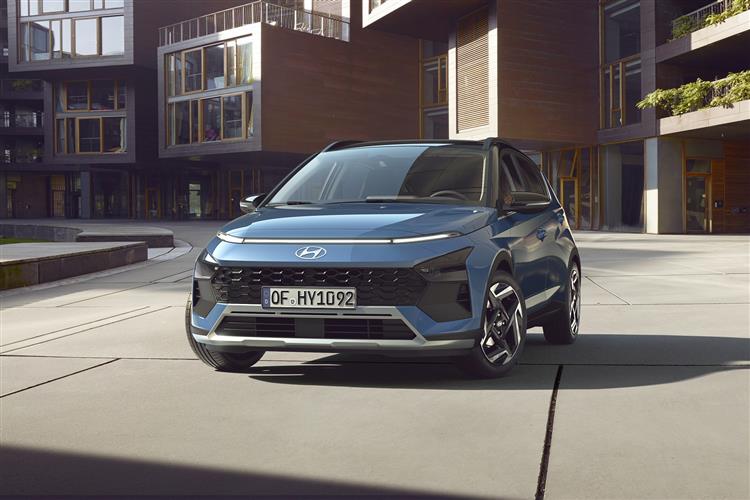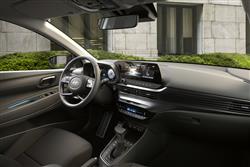How will you view?
This is a sample, and will stop after 30 seconds.
BAYWATCH (some text hidden) SECTIONED_new_hyundaibayon_2021
By Jonathan Crouch
The improved version of Hyundai's Bayon offers yet another option at the more affordable end of the small SUV segment. Jonathan Crouch takes a look
Ten Second Reviewword count: 75
Hyundai's entry-level crossover model is this car, the Bayon, here usefully updated. It takes established engineering from the brand's i20 supermini and delivers it with the trendier crossover vibe that customers for small cars increasingly want. Plus there's also the advantage of a more sophisticated and more spacious cabin than you'd get with a conventional small hatch. This is a much-copied formula of course, but this Hyundai delivers it with value and a class-leading warranty.
Backgroundword count: 103
You'd be forgiven for not knowing that Hyundai has an entry-level SUV, the Bayon. Most of the headlines get taken by the brand's only slightly larger Kona crossover model, but if you don't need that car's Hybrid or EV drivetrains, then the Bayon offers most of what you want at a significant price saving. It's basically a crossover version of the company's i20 supermini, which used to offer an SUV-style iX20 derivative. Launched in 2021, the Bayon more credibly succeeded that rarely-purchased variant but has been quite a rarely seen sight on our roads since. Perhaps that will change with this facelifted model.
Driving Experienceword count: 449
Curiously, probably the most significant change with this updated Bayon is a backward step; the mild hybrid-assisted engine it had at its original launch has been swapped out for an unelectrified version of the same 1.0-litre T-GDi three cylinder petrol unit. Other markets get the option of this engine with 120PS, but here it comes only in its base 100PS form. This powerplant can be matched either with the brand's clever 6-speed 'iMT' Intelligent Manual Transmission (with 172Nm of torque) or a 7-speed dual clutch DCT automatic gearbox (200Nm). As before, there are three selectable driving modes - 'Eco', 'Normal' or 'Sport' - with the latter offering a rev matching function for the iMT manual gearbox. That iMT set-up allows the car to enter into two possible levels of coasting depending on the conditions, the first leaving the engine idling and the second turning it off completely, though it will of course spring to life again the moment your foot touches the throttle. Refinement at cruising speeds is pretty well judged, though not quite up to the standards set in this class by, say, a Volkswagen T-Cross or a Peugeot 2008. Move onto fast secondary roads and the little three cylinder engine's characteristically vibrant soundtrack is a little more evident and this, together with the slightly firm ride and well-judged body control, might encourage you to throw the thing about a bit, were you to be running late for your gym session or the school pick-up. The car certainly changes direction quickly at speed and clings on tenaciously through tight turns. Unfortunately though, the rather lifeless steering rack fails to communicate back much of what's happening beneath the front wheels and that slight firmness to the ride quality is unwelcome when you return to the city limits and encounter the usual speed humps and tarmac tears. What Hyundai's engineers still need to learn is the art of producing a small SUV with a ride and handling balance better suited for all kinds of roads - the kind of benchmark currently set in this segment by the Ford Puma and the Nissan Juke. In suburbia, where that light steering comes into its own for easy manoeuvring, you might initially need to adjust to the feel of the way that this car decelerates and brakes itself: there's a marked slowing when you come off the throttle as the mild hybrid system's generator works against the falling engine revs to create electricity and the pedal need a firm prod if it's to generate instant retardation. But it's something you quickly adjust to in a car that demands little of you and delivers more in terms of drive dynamics than you might expect.
To see the full road test text contact us on 0330 0020 227
Pictures (high res disabled)

.jpg)
|
.jpg)
|
.jpg)
| |||
.jpg)
|
.jpg)
|
.jpg)
| |||
.jpg)
|

|
Statistics (subset of data only)
Min |
Max |
|
Price: |
£22,480.00 (At 10 Dec 2024) |
£26,530.00 (At 10 Dec 2024) |
Insurance group 1-50: |
14 |
|
CO2 (g/km): |
125 (1.0 T-GDi 100PS) |
124 (1.0 T-GDi auto) |
Max Speed (mph): |
113 (1.0 T-GDi 100PS) |
|
0-62 mph (s): |
10.7 (1.0 T-GDi 100PS) |
|
Combined Mpg: |
51.4 |
|
Length (mm): |
4635 |
|
Width (mm): |
1890 |
|
Height (mm): |
1605 |
|
... and 2 other stats available | ||
Scoring (subset of scores)
Category: Crossover or SUV 4x4s
| Performance | |
| Handling | |
| Comfort | |
| Space | |
| Styling, Build, Value, Equipment, Depreciation, Handling, Insurance and Total scores are available with our full data feed. | |



